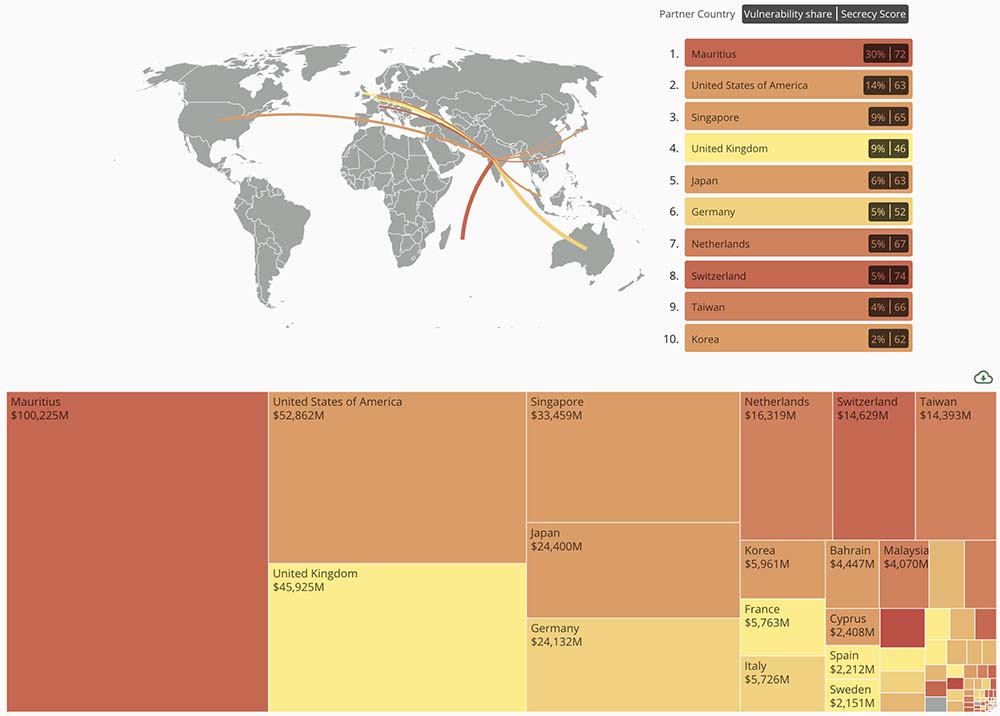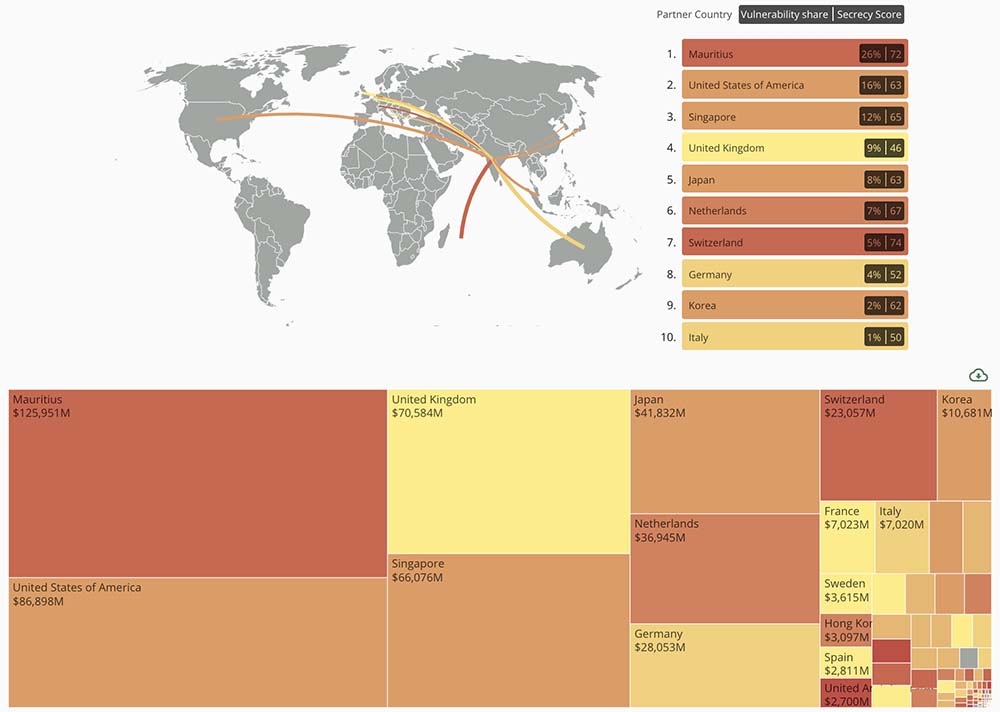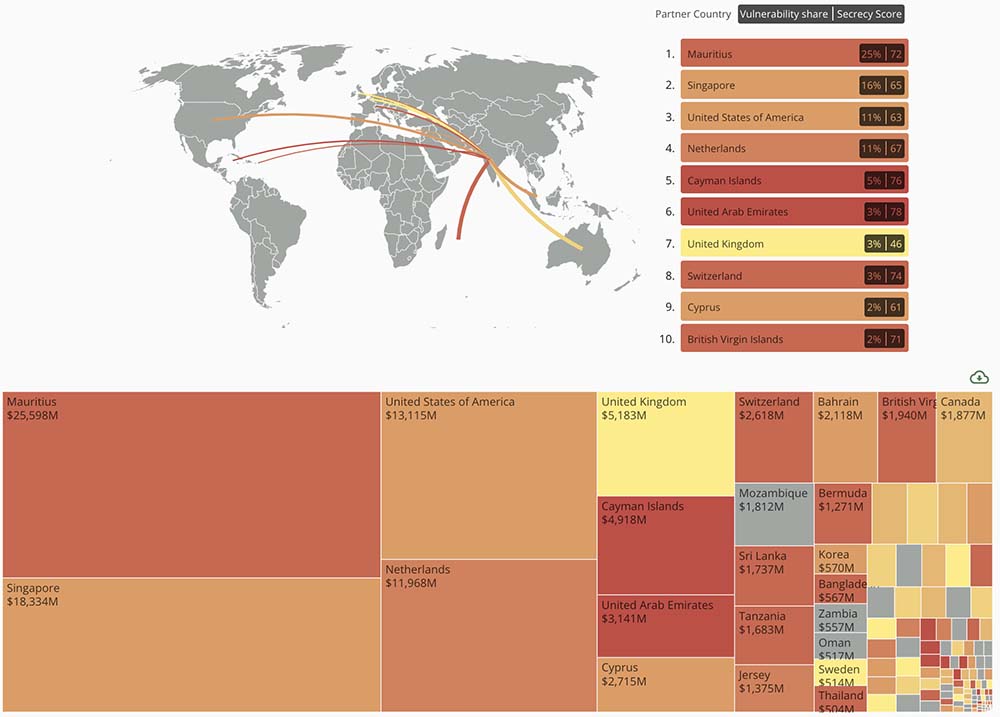
Tax Justice Network ■ India: an economy under siege from IFFs?

Blog by Neeti Biyani, Centre for Budget and Governance Accountability, New Delhi
Geopolitically, India is one of the most significant countries on the planet, with a GDP of almost $3 trillion and the fifth largest economy in the world. It is surprising, then, that the tiny island nation of Mauritius – with a GDP of approximately US $14 billion and a population of just 1.3 million – is the largest foreign investor in India.
The Mauritius Leaks, an investigation by the International Consortium of Investigative Journalists in 2019 offered clues as to why this might be the case. From being an idyllic island nation, Mauritius made a concerted decision to follow in the footsteps of numerous British Crown Dependencies and transformed itself into an offshore financial centre starting in 1989. Seeking to diversify its largely agrarian economy, Mauritius positioned itself as a jurisdiction of choice for multinational corporations and investors looking to invest in developing African, Asian and Arab countries.
Through the enactment of the Mauritius Offshore Business Activity Act (1992) to govern the country’s offshore financial services sector, it paved the way for foreign companies to incorporate subsidiaries with limited public disclosure, extremely low tax rates and a high degree of secrecy and asset protection. And by creating an intricate network of bilateral investment, tax and trade treaties with mostly developing countries, Mauritius proceeded to build one of the most aggressive offshore regimes in the region.
Along with offering low taxes, the network of Investment Promotion and Protection Agreements (IPPA), commonly known as Bilateral Investment Treaties, essentially protects and allows foreign-owned holding companies to become Mauritian resident companies. This incentivises businesses and investors to invest in other regions, mainly Africa and Asia, while operating under the garb of the Mauritian flag.
Often detailing taxing rights, these treaties constrict the taxing rights of developing countries, as profits are shifted to low-tax jurisdictions such as Mauritius – thus depriving developing countries of the revenue they rightfully deserve. The IPPA network provides measures against any efforts towards expropriation and nationalisation by partner countries. Due to the very nature of IPPAs, countries often end up losing money by way of litigation, penalties and compensation if the investors are unable to recover the investment made.
Despite evidence that double taxation agreements (DTAs) cause considerable and unnecessary loss of revenue from developing countries, resource-strapped low-income countries in particular are forced into entering unfair and unjust treaties to attract FDI in the absence of any alternatives.
India and Mauritius too had such a double tax treaty for many years, which proved irresistible to multinational corporations seeking to avoid paying their fair share of taxation. In the absence of a democratic global system of governance in this domain, most countries manage their tax relationships with other nations through bilateral agreements called double tax treaties. Indeed there are now over 3,000 of these agreements, ostensibly designed to prevent companies from having to pay tax twice in two different jurisdictions, in effect around the world. The proliferation of these accords has in turn fuelled the phenomenon of ‘treaty shopping’, through which multinational companies seek to exploit loopholes and inconsistencies by creating a fake paper trail for the goods and services they provide, and thereby pay less to government coffers. All too often, they succeed in paying no tax at all. In fact, research has shown that developing countries lose billions in tax revenues due to treaty shopping strategies employed by multinational corporations.
Until recently, the double tax agreement between India and Mauritius was notorious, with such vast revenue flows moving between the two countries that Mauritius became, on paper at least, India’s largest investor. At the same time, many Indian exporters were also invoicing their goods through shell companies in Mauritius, again to avoid tax liabilities in their home country.
For over 30 years, firms have been able to avoid paying capital gains taxes on sales using the Mauritius-India DTAA signed in 1982. Research by Centre for Budget and Governance Accountability, New Delhi has shown that between 2000 and 2017, Mauritius accounted for 34 percent of foreign direct investment into India. According to the Reserve Bank of India, in 2018, foreign direct investment from Mauritius accounted for US $13.4 billion, accounting for 36 percent of India’s total investments.
What was really happening was that investors were using Mauritius as a conduit, routing capital through shell companies in the country and then into India through a tax avoidance technique known as ‘investment round tripping’. In this context, it means that capital from India was usually routed to Mauritius, a jurisdiction with a lower corporate income tax rate. Indeed, the rate they paid could descend to zero if the money was held in special types of registered companies. Then the capital is sent back to India in the form of foreign direct investments and, thanks to the double tax treaty, an investor can claim she’ll pay tax in the conduit country (i.e. Mauritius). For the same reasons, the Mauritian route was also used by Indian companies that were investing outside of India.
In 2016, after years of negotiations, India managed to renegotiate its tax treaty with Mauritius and, by reimposing capital gains taxes on investors ‘from Mauritius’ who buy shares in Indian companies, it plugged one of the tax avoiders’ favourite loopholes. The treaty amendment went into force in April 2017 and applied half of the prevailing rate of capital gains tax until 1 April 2019, following which the full rate applied.
However, while the treaty amendment closed the benefit of zero capital gains tax, other vehicles used for avoiding taxation, including mutual funds and exchange-traded derivatives, were not adequately addressed in the renegotiation, so alternative channels for illicit financial flows remain in place. Furthermore, although both India and Mauritius are parties to the Multilateral Instrument (MLI) created by the OECD to prevent the abuse of double tax treaties in cases where the principal purpose of a business arrangement is to save tax, Mauritius has not included its tax treaty with India in its MLI commitments.
And as shown by Tax Justice Network’s new Illicit Financial Flows Vulnerability Tracker, Mauritius was still India’s number one source and destination for both inward and outward foreign direct investment in 2018. In fact, in 2018, the inward direct investment stock from Mauritius (estimated at almost US$ 126 billion) was even higher than such investment in 2015 (estimated at around US$100 billion).
Despite a sudden and telling drop in direct investment from Mauritius to India in 2019, the corresponding figures for Singapore – the second most popular tax haven among India’s economic elite – have grown enormously in recent years. Indeed, the volume of investment from Singapore to India doubled from US $33.5 billion in 2015 to US $66 billion in 2018. The Netherlands is a close second in terms of acceleration of investment into India since the revision of the India-Mauritius treaty.

It must also be underlined that, of the top ten destinations for direct investment in India, six are either corporate tax havens or financial secrecy jurisdictions (the United States, Switzerland, Singapore, Japan, The Netherlands, and the United Kingdom – which if considered together with its spider web of jurisdictions would have ranked first on both indices). This suggests that the Indian economy is severely exposed to international tax avoidance schemes, and other illicit financial flows, that are likely to be systematically draining state coffers of resources desperately needed to tackle both the ongoing Coronavirus health emergency and the concomitant economic crisis.
In this context, it is unsurprising that India has been one of the leading voices calling for developing countries to have a more meaningful role in negotiations on the international governance of taxation. Efforts to address the dysfunctional global tax system have thus far been led by the OECD under the Base Erosion and Profit Shifting (BEPS) process. However, this process, negotiated behind closed doors by rich countries, has largely excluded the voices of developing countries. Repeated calls from developing nations for a genuinely democratic, inclusive body under the auspices of the United Nations have likewise been thwarted by richer countries. With the US having now demanded the OECD process be put on hold, it is high time for the international community to work together for a radical reform of global tax rules through a genuinely inclusive process in which all can participate on equal footing. Such a process is only possible at the United Nations.
Image of Indian banknotes courtesy of Rupixen/Unsplash
Related articles

UN tax convention hub – updates & resources

The Bitter Taste of Tax Dodging: Starbucks’ ‘Swiss Swindle’
Disservicing the South: ICC report on Article 12AA and its various flaws
11 February 2026

What Kwame Nkrumah knew about profit shifting
The last chance
2 February 2026

After Nairobi and ahead of New York: Updates to our UN Tax Convention resources and our database of positions
Taxing windfall profits in the energy sector
14 January 2026

The tax justice stories that defined 2025

The best of times, the worst of times (please give generously!)

Let’s make Elon Musk the world’s richest man this Christmas!




